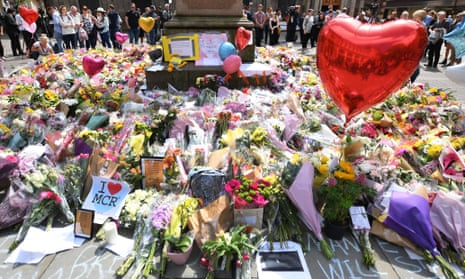Members of Britain’s Libyan diaspora have said they warned UK authorities for years about Islamist radicalisation taking place in Manchester, as investigations continued into Salman Abedi’s contacts before the bombing in the city.
Salah Suhbi, an MP in Libya who grew up in Sheffield, said Libyans in Manchester had been warning about terrorist recruiters operating openly in the city.
“Manchester has the biggest community of Libyans in Britain and they know exactly what’s happening, there’s a recruitment policy, we’ve been warning about it for years,” he said. “People have been talking about this for the past three or four years, how ruthless they [the Islamist recruiters] are. These people are recruiting from the second and third generation Libyan Brits or Arab Brits.”
Britain is home to a large Libyan community, many having fled Gaddafi’s Libya in the 1980s and 90s. Suhbi said the vast majority are horrified by the Manchester killings, adding: “We are really upset this is happening in the UK. Libyans have had a positive impact on the UK, there are 3,000 Libyan doctors in the NHS.”
One of those doctors is Ghazi Gheblawi, who lives in London, who said the sense of shock has reverberated through the diaspora. “What happened in Manchester is tragic on so many levels, the Libyan community in the city is in deep sadness and shock.”
He said many Libyans in the UK fear that the spreading of Isis ideology in Libya may expand to Britain. “[The UK authorities] have a lot to do do prevent this ‘disease’ from festering and poisoning them, as it did back in the homeland.”
Another Libyan long-term UK resident said: “Manchester has long been targeted by radicals, there are those who are surprised by this attack but the radicalisation is nothing new. As the situation gets worse in Libya there will be more radicals in Manchester.”
Britain has strong links with Libya, and the prime minister of the UN-backed Tripoli government, Fayez Sarraj, settled his family in the UK.
The diaspora celebrated the Arab spring, which saw the fall of Muammar Gaddafi, hoping it would bring freedom and democracy. Instead chaos and civil war followed. One exile in London said: “I always hoped after the revolution we’d get a corrupt, but elected, kind of government. Instead we have anarchy.”
Isis has been in Libya for nearly three years, and has gained notoriety for persuading young men to carry out attacks abroad. Two years ago Seifeddine Rezgui, trained by Isis in western Libya, killed 38 tourists, 30 of them British, at Tunisia’s Sousse resort.
In December, US-backed Libyan militias captured Sirte from Isis, but its units continue to operate across the country.
Isis has found operational space in Libya by taking advantage of the chaos of a civil war between forces of rival governments in Tripoli and Tobruk.
That war is at boiling point after 141 Tobruk army soldiers were killed at an airbase in the south last week. Human Rights Watch says it has evidence that many of the men were executed and the UN secretary general, António Guterres, has called for a war crimes investigation.
The Tripoli government has suspended its defence minister and promised an inquiry, insisting it had no control over the militias who launched the attack. But the killings have provoked an upsurge in fighting, derailing recent diplomatic efforts to create a compromise unity government.
